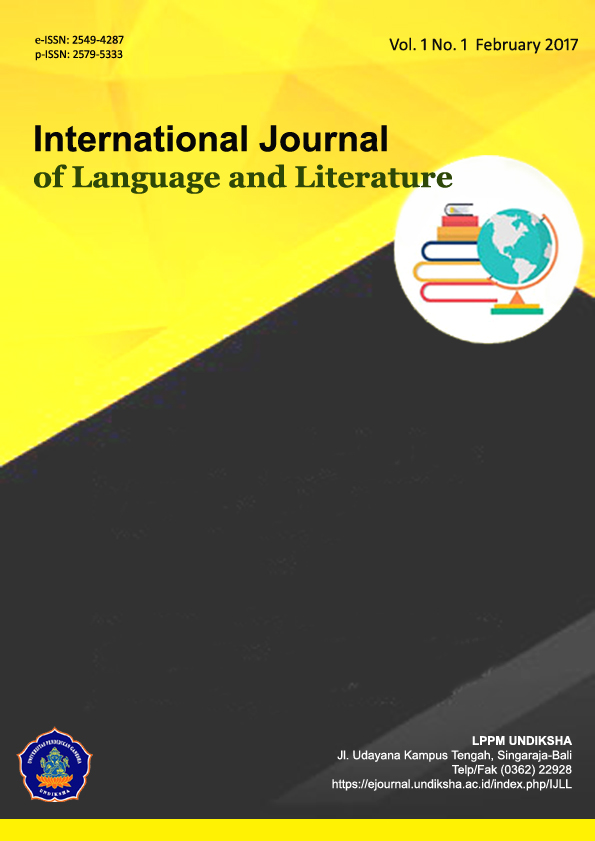Teachers’ Attitudes in Conducting the Formative Assessment on Students’ Speaking Competence
DOI:
https://doi.org/10.23887/ijll.v6i4.34439Kata Kunci:
Formative Assessment, Online Assessment, Teachers’ PerceptionAbstrak
Current online learning requires teachers to be proficient in using online-based assessments by looking at their students' progress in their speaking skills. Thus, this study aimed to investigate teachers' perception of the use of formative assessments in online learning of junior high school students' speaking competence. This research was conducted at two junior high schools located in Tejakula village. Seven English teachers were involved in the study. This research was mixed-method research by combining quantitative data and qualitative data. In this study, data collection was collected with questionnaires and in-depth interviews to obtain information about teachers’ perceptions. This research revealed that respondents have a positive attitude towards formative assessments in online learning towards students' speaking competence.
Referensi
Ahmedi, V. (2019). Teachers’ attitudes and practices towards formative assessment in primary schools. Journal of Social Studies Education Research, 10(3), 161–175.
Amua-Sekyi, E. T. (2016). Assessment, student learning and classroom practice: A review. Journal of Education and Practice, 7(21), 1–6. http://search.ebscohost.com/login.aspx?direct=true&db=eric&AN=EJ1109385&site=ehost-live.
Baleni, Z. G. (2015). Online formative assessment in higher education : Its pros and cons. The Electronic Journal of E-Learning, 13(4), 228–236.
Hamid, R., Sentryo, I., & Hasan, S. (2020). Online learning and its problems in the Covid-19 emergency period. Jurnal Prima Edukasia, 8(1), 86–95. https://doi.org/10.21831/jpe.v8i1.32165. DOI: https://doi.org/10.21831/jpe.v8i1.32165
Karim, B. H. H. (2015). The impact of teachers’ beliefs and perceptions about formative assessment in the university ESL class. International Journal of Humanities Social Sciences and Education (IJHSSE), 2(3), 108–115.
Kiliçkaya, F. (2017). Improving formative assessment in language classrooms using Gradecam Go! Teaching English with Technology, 17(4), 78–92.
Kippers, W. B., Wolterinck, C. H. D., Schildkamp, K., Poortman, C. L., & Visscher, A. J. (2018). Teachers’ views on the use of assessment for learning and data-based decision making in classroom practice. Teaching and Teacher Education, 75, 199–213. https://doi.org/10.1016/j.tate.2018.06.015. DOI: https://doi.org/10.1016/j.tate.2018.06.015
Kulal, A., & Nayak, A. (2020). A study on perception of teachers and students toward online classes in Dakshina Kannada and Udupi District. Asian Associations of Open Universities Journal, 15(3), 285–296. https://doi.org/10.1108/AAOUJ-07-2020-0047. DOI: https://doi.org/10.1108/AAOUJ-07-2020-0047
Widiastuti, I. A. M. S., & Saukah, M. (2019). Formative Assessment Classroom Practices. Supporting Teachers’ Formative Assessment Practice With Learning Progressions, 89–107. https://doi.org/10.4324/9781315562636-8. DOI: https://doi.org/10.4324/9781315562636-8
Yan, Z., & McLaughlin, T. (2017). Diverse delivery methods and strong psychological benefits: A review of online formative assessment. Journal of Computer Assisted Learning, April, 1–13. https://doi.org/10.1111/jcal.12200. DOI: https://doi.org/10.1111/jcal.12200
Unduhan
Diterbitkan
Cara Mengutip
Terbitan
Bagian
Lisensi
Hak Cipta (c) 2023 International Journal of Language and Literature

Artikel ini berlisensiCreative Commons Attribution-ShareAlike 4.0 International License.
IJLL Journal provides immediate open access to its content on the principle that making research freely available to the public to supports a greater global exchange of knowledge.

This work is licensed under a Creative Commons Attribution-ShareAlike 4.0 International License







